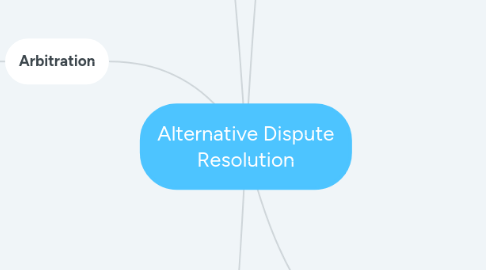
1. Arbitration
1.1. Advantages
1.1.1. Selection of the arbitrator
1.1.1.1. Parties can select arbitrator vs court where judge is assigned
1.1.2. Privacy
1.1.2.1. There is no public record of the arbitration
1.1.3. Flexibility
1.1.3.1. Flexible schedule for hearing that does not rely on the court schedule
1.1.3.2. Simple rules that apply to procedure
1.2. Disatvantages
1.2.1. Lack of formality
1.2.1.1. Parties rely on the skills of arbitrator to sort out evidence
1.2.1.2. Ruling is final without chance to appeal
1.2.1.3. There is no public record
1.2.2. Limitation of recource
1.2.2.1. Ruling may cover underlying legal issue
1.2.3. Discretion of arbitrator
1.2.3.1. Makes decision on his own without any explanation
1.2.3.2. Lack expertise in the area
2. Litigation
2.1. Lawsuit to determine legal issue
2.2. Argument between legal representatives regarding legal issue
2.3. Legal issue becomes a public affair
3. Arbitrator qualifications
3.1. Confidence of parties
3.1.1. Both parties must be confident with arbitrator of their choosing
3.2. Impartiality
3.2.1. Arbitrator must be impartial to both parties to ensure fair ruling
3.3. Education
3.3.1. Bachelor's degree in Law
3.3.2. Experience in Law
3.3.3. Supplemental experience in business industry
3.4. Training
3.4.1. Basic Arbitrator Training Program
3.5. Skills
3.5.1. Communication skills
3.5.2. Conflict resolution skills
3.5.3. Good moral character
4. Mediator qualifications
4.1. Education
4.1.1. Bachelor's Degree in one of the following field: law, psychiatry, psychology, counseling, family therapy, behavioral or social science
4.2. Training
4.2.1. Approved mediation training
4.2.2. Training in domestic violence and child abuse
4.2.3. Training in divorce and custody mediation
4.3. Professional liability insurance
4.4. Skills and Compitancies
4.4.1. Mediator should comply with ethical standards
4.4.2. Mediator should have communication and negotiation skills
4.4.3. Mediator should have conflict resolution skills
4.4.4. Good moral character
4.5. Mentorship
4.5.1. Mandated observation or co-mediating of mediation cases
5. Mediation
5.1. Advantages
5.1.1. Control
5.1.1.1. Informal environment allows parties to discuss legal matter directly without official court proceedings
5.1.1.2. Parties involved are able to choose location for mediation
5.1.1.3. Flexibility on topic of discussion between parties involved
5.1.2. Fast and Inexpensive
5.1.2.1. No court fees or other fees associated with trial
5.1.2.2. Small fee for mediator
5.1.2.3. Parties voluntarily agree upon settlement during mediation without court judgment
5.1.3. Privacy
5.1.3.1. Parties involved do not disclose an issue outside of mediation
5.1.3.2. Parties walk away without admission of guilt that cannot be used in court
5.2. Disadvanges
5.2.1. Negotiation process
5.2.1.1. Parties may not come to any resolution of dispute leading to possible arbitration and litigation
5.2.1.2. Parties may come to negotiation that may not be in their best interest
5.2.1.3. Revealing information or tactics of the parties that can be used against them in court if negotiation fails
5.2.2. Privacy
5.2.2.1. Legal matter becomes private that prevent party from conviction on repeat of misconduct
5.2.3. No formal rule
5.2.3.1. Settlement is not formal rule but voluntarily compromise that involves both parties
5.2.3.2. Settlement does not prevent parties involved filing lawsuit in the future
